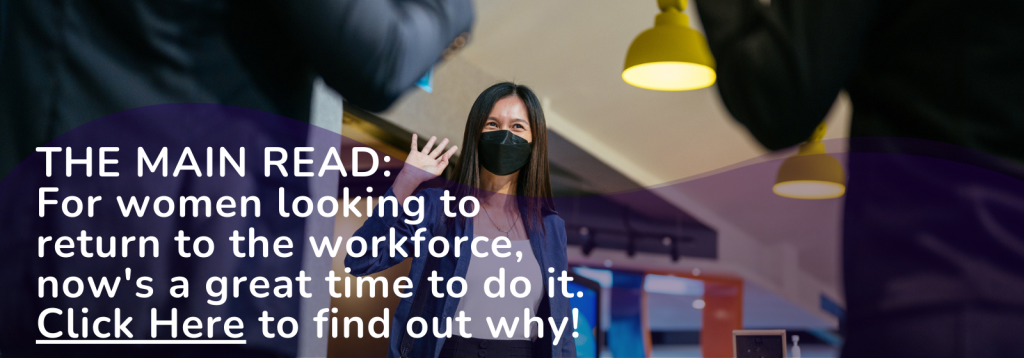Christine Gan is a principal career coach at Workforce Singapore, which launched the “herCareer” initiative to help women seeking to rejoin the workforce. She shares tips on the topic, as well as some anecdotes from her own career experiences.
Christine: I started my career in marketing and was subsequently headhunted to spearhead the media arm of an executive search firm.
After some years of being a managing partner in a search firm, I decided to take a sabbatical from work after giving birth to my second child.
In 2011, I made the tough decision of rejecting a job offer and uprooting my whole family to a foreign country as my husband had been relocated overseas for three years.
As a go-getter and a high-achiever, I did not see myself as a stay-home mum for an extended period of time.
During my spare time overseas, I volunteered at a church to help people overcome difficulties that they faced and guided them in their career options. This helped me to continue sharpening my skills and broaden my experience in career guidance.
Towards the end of my husband’s secondment in 2014, I realised that I had to reassess my work values and career options as my kids were already much older and more independent.
My volunteer work made me prioritise certain careers where I could give back to society whilst still leveraging my past experience.
When I returned to Singapore, I considered either a teaching or coaching role, and eventually decided to join Workforce Singapore (WSG), then Singapore Workforce Development Agency, as a career coach in August 2015.
What struggles do women returning to the workforce face?
Over the past few years, I have seen many women who are unsure when, if or how they should go about returning to the workforce. Do they put their family, personal or financial needs first? For some, it was an emotional struggle with no answer to that question. The Covid-19 pandemic probably made it more challenging for them with an additional burden as caregivers to the family.
As a career coach, I help my clients manage their emotions and then walk them through the process of self-discovery in order for them to know their strengths, competencies and priorities.
With the clarity, we are then better able to help them identify suitable roles and opportunities. This often takes time, and a huge dose of tenacity as the journey may not be smooth.
I met a former female software developer who left the workforce to care for her newborn with special needs.
Two years later, she tried returning to the workforce to help the family cope with mounting expenses.
However, the rapid changes in the information technology (IT) industry made her feel that her skill sets were obsolete, and she found it hard to articulate her unique selling point to prospective employers.
Confidence was at an all-time low when she came to WSG as her countless job applications yielded no result. We worked out a plan to identify her strengths and gaps that needed to be addressed.
Coupled with her own grit and determination, she eventually managed to return to familiar territory in the IT sector.
Re-entering the workforce later is not always a straightforward endeavour as a career gap can be a difficult hurdle to overcome in the job search journey.
However, the journey can be less arduous if you have the right mindset and a long-term plan. Rejections are good life lessons. Use them to assess areas to improve on and skills to acquire.
Some advice for back-to-work women
- Make a long-term plan and take small steps towards achieving it.
Be patient and do not rush into making any decisions as several pieces need to fall into place — from ensuring that your childcare needs are well taken care of to finding the right job.
When you are ready, seek to find your strengths, career values and interests, as well as the current job market.
Take up courses to bridge any skills gaps. Work on your resume and include a career summary that speaks about your professional background and skills that can add value to the job role that you are applying for.
Tailor the resume to showcase that you have the right knowledge, skills and attributes that are aligned with the job requirements that employers are looking for.
- Identify your past skills, both hard and soft skills, and skills you acquired during your career absence.
One way to identify your own soft skills is through self-reflection, by asking yourself behavioural questions that employers commonly ask during interviews. Such questions include:
- Reflect on a time when you solved a challenging problem or conflict at work or even when at home.
- Reflect on a situation where you did not get a response that you expected or where someone seemed to have taken you the wrong way.
- Reflect on how you handled a mistake and were asked to make corrections.
This is a good exercise to analyse what one considers to be their strengths as well as areas where they can improve.
It is also advisable to ask for feedback from trusted friends or mentors as it may reveal blind spots in one’s self-perception, and to gain valuable insights.
- Do not denigrate your ability and skills acquired even as a “homemaker”, as skills such as planning, multi-tasking or even teaching, are useful in the workplace.
It is useful to see how these soft skills are relevant to the job scope that you are applying for and be able to articulate this to the hiring manager.
This can increase your chances as it reflects well on you and shows the employer that you have done your homework.
- Start networking early and build contacts in the field that you are interested in embarking on.
You can start by setting up coffee dates with ex-colleagues, joining membership organisations that match your professional interest, attend walk-in interviews or career events.
Join relevant LinkedIn groups or follow organisations where you can initiate and contribute to discussions to get up to date with current issues, as well as to raise your profile to prospective ‘employers who are hiring.
Last but not least, aside from these formal routes, take on an active role in social or community activities such as volunteering, as they can also help build up your skills, experience and networks!
Singapore’s back-to-work women deserve their chance
The recent White Paper on Singapore Women’s Development outlined concrete actions to take collectively in building a fairer and more inclusive society.
Our workplaces must reflect our societal values of fairness, inclusivity and progressivity, and employers should be part of the ecosystem as well. Women returning to the workforce after a career break can be a valuable resource to employers and boost diversity.
Hard or technical skills can be learnt. Oftentimes, it can be a wrong perception that they have “cobwebs” in their technical skill sets just because they have been out of a job for a while.
I would encourage employers to assess these candidates based on their past achievements, instead of focusing on their gaps.
Understand what they did during their career break that may be of value to your organisation, and not devalue the skills that they have gained during this time.
You may be surprised to know that parenting can translate into worthwhile job skills, including time management, problem-solving and better communication.
I am thankful for WSG for seeing the potential in me, instead of the gap years. Similarly, the organisation that gave my client a shot, felt richly rewarded for her contributions as she outshone the rest of her team.
She was able to acclimatise into her role quickly and contribute immediately with her past years of experience and knowledge.
Her deep sense of responsibility, independence and nurturing nature that was further honed as a stay-home mum gave her employer the assurance that the team was in her good hands when the boss was on overseas leave.
Just like how jobs are being redesigned to create an agile and more productive workforce, we can definitely also redesign the roles of women so that they can excel alongside their male counterparts and have equal opportunities to achieve their aspirations!”
This article was first published on Today















